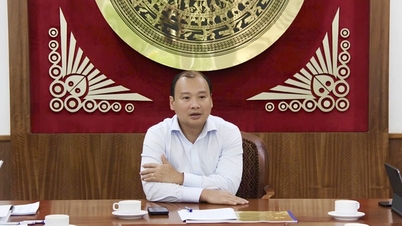Cybersecurity expert Ngo Minh Hieu (Hieu PC) suggests that just by asking the other person to show their teeth, you can immediately tell if the Deepfake call is a scam.

Cybersecurity expert Ngo Minh Hieu points out two "red flags" to identify fraudulent calls - Photo: VU TUAN
Ask to turn around and show your teeth to distinguish scam calls
Cybersecurity expert Hieu PC - representative of Chongluadao.vn said that if you suspect that the person calling you on video is a scammer, just ask them to turn left, turn right, stand up or simply... show their teeth to know if they are a scammer or not.
He analyzed that the current deepfake artificial intelligence (AI) algorithms during real-time calls will not be able to handle it if the caller turns left, turns right or stands up.
A particular weakness is the teeth, these AI algorithms have not yet reproduced the teeth of the person being impersonated.
"If it's a fake, when opening their mouths, some people have no teeth, some have 3 or even 4 teeth. Therefore, the teeth are an easy feature to recognize when a call is fake" - Hieu PC said.
Talking to Tuoi Tre Online , he said that he just needed to follow Pham Thoai's method in the livestream (the livestream showing the statement of the donation for Mother Bap's medical treatment - PV): "show me your teeth so I can see" to know immediately if it was a scam call or not.
Two "red flags" to identify scam calls
According to cybersecurity experts, a common trick is to impersonate the voice or face of a relative over the phone or FaceTime, tricking the victim into transferring money. "They can call from a strange number, using a voice identical to a friend to ask for urgent money" - Hieu PC informed.
More seriously, hackers use AI to cut and paste 18+ videos with the victim's face, then send blackmail emails, threatening to spread them if the fee is not paid. In Vietnam, cases of emotional fraud via video calls are on the rise.
In recent months alone, authorities have received at least 2-3 complaints each month about similar cases. Most of the victims are young people and students who were befriended by bad guys on social networks, lured into video calls, and then edited sensitive images to blackmail them.
Cybersecurity expert Hieu PC also pointed out two red flags of a scam call. These are the request to transfer money and the request to click on a strange link. "If this happens, hang up immediately!" - he said.
With suspicious FaceTime calls, call back to verify through a familiar number, using private questions that only your loved ones know.
A very common sign of these scam calls is that when talking, the other person often avoids personal information. "If the other person avoids or the Wi-Fi is unstable, then 90% of the time it is a scam" - Hieu PC affirmed.
 Tired of scam calls
Tired of scam callsSource: https://tuoitre.vn/hieu-pc-mach-nuoc-yeu-cau-doi-phuong-nhe-rang-de-phat-hien-cuoc-goi-lua-dao-20250227194754364.htm

































































































Comment (0)